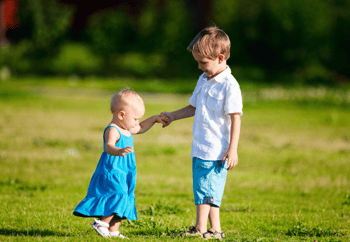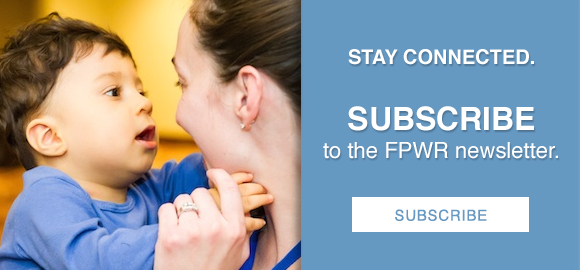
Being a mom and a psychologist, I have often wondered about the impact of growing up with a person with Prader-Willi Syndrome (PWS) on siblings. There are research studies that indicate that growing up with a sibling with a developmental disability can impact individuals in a variety of different ways, some positive, some negative.
Positive impacts include the development of empathy and compassion, as well as understanding and appreciating individuals who have differences. In fact, in my years working in healthcare, many of the most caring and committed doctors, nurses, and therapists that I have met have a close family member with a disability or chronic health challenge.
But there can also be unique challenges that siblings face growing up in a different type of family than their peers. How those individuals cope with the challenges of having a sibling with a developmental disability can be influenced by many factors, such as overall family functioning, family communication, what resources the family has, and the specific diagnosis and severity of associated behavior problems in the person with the disability (Marquis et al., 2019; Petalas et al., 2012).
For PWS, we know that moderate to severe behavioral difficulties are common among children and adults with PWS, and these behaviors have the potential to significantly impact family functioning. Additionally, PWS families live in a different world when it comes to food. These families typically modify routines and make environmental adaptations to address hyperphagia (intense hunger), which is one of the most common symptoms of PWS.
Many families find that they need to create strict routines around food as well as use locking devices on cupboards and refrigerators to help create a food secure environment for the person with PWS. However, this creates an unusual environment for other siblings to grow up in, which may impact their own relationship with food or lead to other challenges.
In addition, PWS siblings may witness behavioral outbursts, self-injury, and/or aggression toward other family members (Araki et al., 2010). Parenting a person with PWS often requires parents to devote a significant amount of their time and resources to caring for the child with PWS, which may also limit their availability at times for their other children. These aspects of PWS can upset the foundation of family life and potentially have short- and long-term impacts on the well-being of siblings.
So how can we help our typical children develop resilience and grow, or, ideally, even thrive, despite the challenges that PWS brings to a family?
To date, there has been little research on how to remediate the potential difficult impacts on these siblings. Further, we have little understanding of the potential positives that may arise from growing up in such a unique family. A new study sponsored by FPWR will explore the impact of PWS on the lived experience of siblings. Our goal is to capture the voice of the sibling growing up with a person with PWS.
As a first step, we will be conducting one-on-one confidential interviews with siblings ages 14 and above. We will gather information about their experiences growing up with a sibling who has PWS, both in terms of challenges and positive experiences. We will ask about what they have learned about their sibling’s PWS, what was or would have been helpful in coping during difficult times related to their sibling, and what resources would be useful to create for siblings of different ages to help them cope with challenges that may arise related to their sibling with PWS.
For part 2 of the study, we will develop a survey for parents to complete related to the experience of younger PWS siblings, which will be in part informed by the individual sibling interviews. We will also include input from PWS clinical experts who have worked with families to get their perspectives on the PWS sibling experience.
The final step of the project will be to create a resource manual and guidebook for siblings and parents based on the results of the study, which will be shared with families, researchers, and clinical professionals. We hope such resources will be useful not only for siblings directly, but also for parents of younger children who are seeking to develop an environment in which all of their children will thrive.
For more information about the study and participation, please reach out to Dr. Lauren Schwartz Roth: lauren.roth@fpwr.org
While you are waiting for the results of the study, below are some currently available resources and information for people who have grown up with a sibling with PWS:
-
FPWR Blog: 'My Life Was Enriched By Having a Sibling With PWS'
-
Prader-Willi Syndrome Association of NZ Support Management for Siblings
-
PWSA Library (has some books for siblings in their library)








